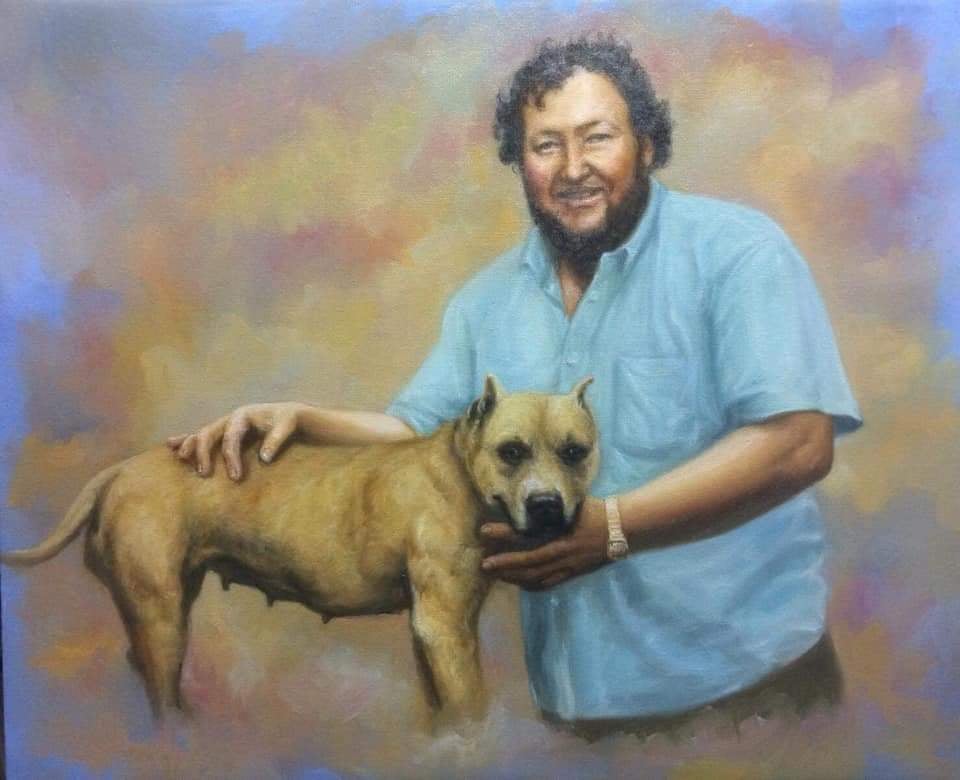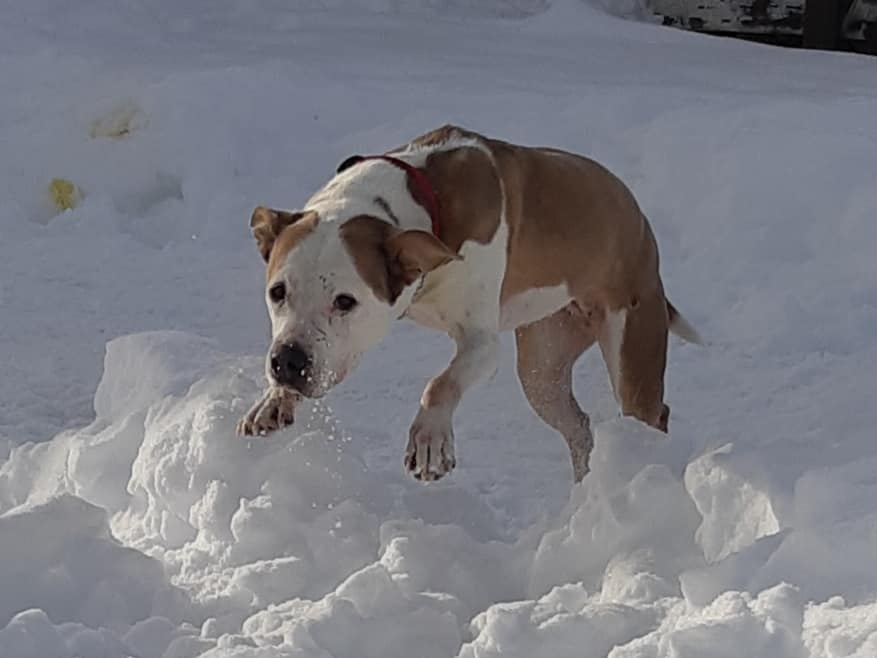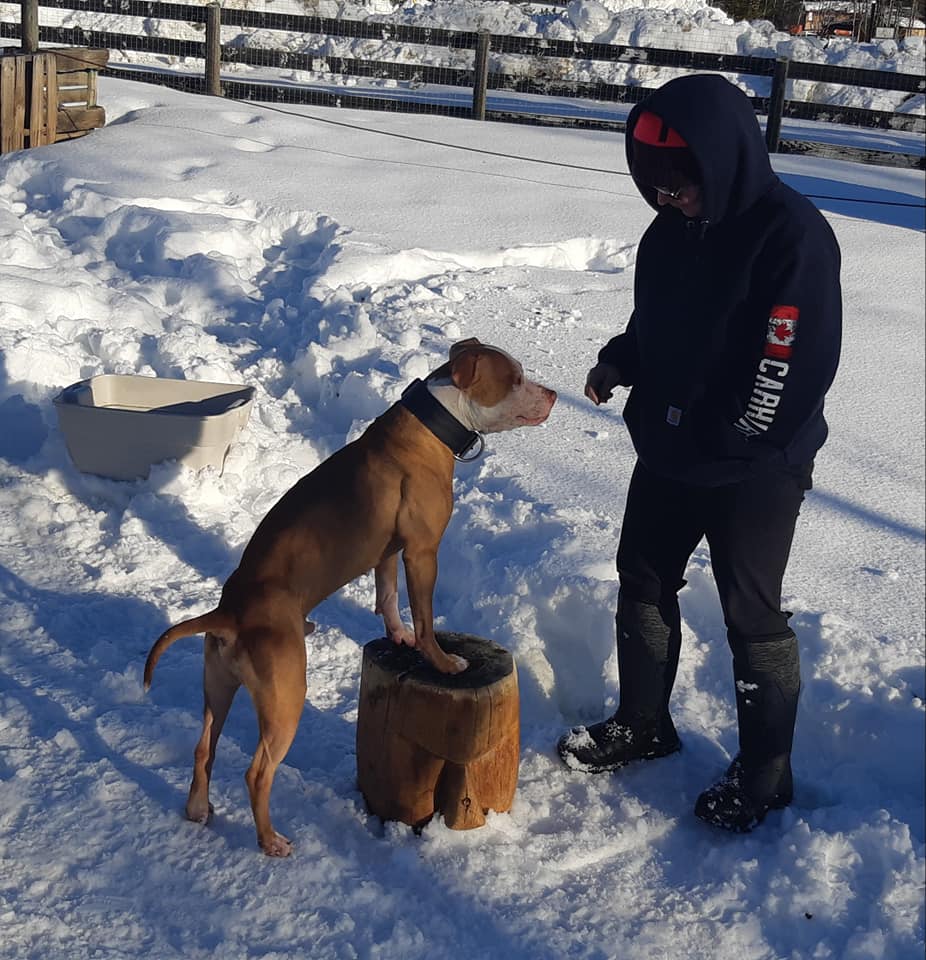Search Posts
Recent Posts
- The Long Goodbye January 18, 2024
- Once More Around the Mulberry Bush January 9, 2024
- The Wash December 28, 2023
- The Truth About Carver Dogs December 1, 2021
- The Question of Pain November 9, 2021
Categories
Subscribe!
Thanks for subscribing! Please check your email for further instructions.
The Question of Pain
I have often thought that if there weren’t so much hysteria about the pit dog game that scientists could learn a lot about pain and possibly its control by studying our dogs. Pain control is a big concern to doctors because so many patients suffer from senseless, terrible pain. But, of course, the dogs will never be studied. That’s too bad because they could possibly provide an insight that’s unavailable from other sources.

Kenny Allen with Tornado, a famous bitch with ten wins.
The dogs seemingly are unbothered by pain that would put most people, as well as other dogs, in shock. Is it true that they feel less pain, or do they just have a mechanism for overriding it? Obviously, the dogs do feel pain when not fighting because they will yelp if stepped on or from some other similar thing. But do they feel pain while fighting? Seemingly not, but it you watch closely, you can see signs that they do. For example, a dog will work its way out of a punishing hold. The most experienced dog men seem to believe the dogs that quit don’t do so from pain. It’s from being so exhausted that they lose interest. However, if they are tired, some dogs show less pain tolerance. Nevertheless, there seems to be some sort of mechanism that enables Bulldogs to override pain when involved in fighting.
I have argued elsewhere (see The Sacred Trait) that Bulldogs have developed a mechanism that provides them pleasure when fighting. That would explain the enjoyment that the dogs obviously feel during a match. That would be explained by the idea that evolution has provided them pleasure centers in the brain that are stimulated by fighting contact. That would be from selective breeding or what scientists call “artificial selection.â€Almost all animals have it to some degree, including humans, but in our breed it is unequaled. In any case, it seems to be there in spades. Does that override the pain or is there some other mechanism for reducing the impact of the pain?

The enthusiasm that the dogs have for fighting spills over into a zest for life.
I have discussed this subject with many knowledgeable and experienced dog men, as well as with scientists in biology or the medical field. Most of the dog men believed the dogs felt some sort of pain. Some felt that gameness enabled them to ignore it. But I’m looking for more tangible explanations. But we can only speculate about the mechanisms if the scientists can’t study the dogs. Some of the scientists with whom I had discussions were quite interested, but they knew that the present climate couldn’t possibly allow them to study the problem.
It’s interesting that dogs never seem to quit because of pain. It can seem that way because if a dog gets tired, he is more aware of the pain and may even complain about it. I’ve heard some pretty savvy dog men state that a dog never quits from pain. Well, almost never, but I’m inclined to agree with that opinion. It’s just that I’m careful about absolute statements, and I try to never make them.
When they get tired, everything bothers them more: the effort, the contact, as well as the pain. That is, it seems to be that way in dogs that aren’t deeply game. Most dog men have seen a dog that has quit is suddenly ready to go again with just a little rest. To me it seems obvious that the deeply game dogs can override fatigue, as well as pain. They are simply remarkable animals and much adored by dog people.

There may be some that argue that the fact that the dogs are so good at the veterinarian’s office is an example that our dogs are more pain tolerant. Well, I won’t argue that they aren’t more pain tolerant. They are. But they still feel it. It is true that veterinarians love to treat our dogs because they are so cooperative. However, I believe that there is a different selective factor here. The dogs that cooperated in their treatment, and seemed to realize that they were being helped, tended to survive. And they left more progeny which were more inclined to be the same way—or even a little more cooperative, as it was likely a trait that kept intensifying.
Back to pain: I think most dog men would agree with me that the dogs do feel some degree of pain. The gameness somehow overrides it. It is highly likely that the dogs have a separate mechanism that helps them cope with pain, as they seem to be more resistant to shock, for one thing. In addition, they stay calm during intense pain, unlike other dogs. As many owners of other breeds have been bitten by their own pets when they were under extreme pain. That would never likely happen with one of our dogs, and that’s just one more thing that makes them special.
If the dogs do have a special mechanism for dealing with pain, and it certainly seems that they do, it is unlikely to be studied. And science and medicine are the poorer for it. And that’s truly sad.
I hole hearted believe it has alot to do with gameness
I agree. I think it is part of what we call gameness.